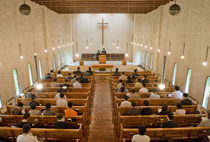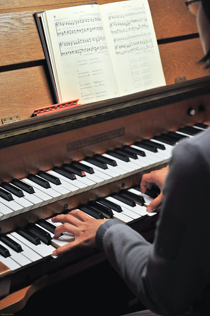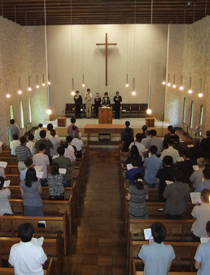TUTS continues to cherish its relationships with the churches of the Reformed and Methodist traditions. At the same time, it continues to be inspired by the spirit and theological convictions of Masahisa Uemura. It is particularly influenced by his emphasis on the formation of strong, responsible churches.
Academically, TUTS is widely respected as a leading theological institution in Japan. At the same time, it is evangelical and dedicated to the mission of preparing men and women for the challenging task of Christian ministry in Japan and around the world.
TUTS is an accredited university and graduate school of theology. A few students enroll directly after graduating from high school and begin a four-year college course leading to a Bachelor of Divinity degree. Most continue for an additional two years to gain the equivalent of a Master of Divinity degree. Most new students, however, have already completed a four-year college degree program. These students study for two years to achieve an undergraduate degree in theology, and study for additional two years to obtain the equivalent of a Master of Divinity degree. In addition, TUTS offers a program leading to a doctoral degree in Biblical Studies or Systematic Theology.
Suburban Location
The seminary campus is located in Mitaka, about 20 kilometers west of downtown Tokyo. The 1.6 hectare campus is adjacent to International Christian University, and Japan Lutheran College & Seminary, with which meaningful cooperative relationships are maintained. The main seminary building, in the shape of a cross, contains a chapel, classrooms, faculty offices, meeting rooms, and administrative offices. The library building provides additional classrooms, faculty offices, missiological institutes, a pastoral care center, and a large meeting room. The dormitory and faculty housing are on campus. The seminary has one of the largest theological libraries in Asia: approximately 100,000 volumes, mostly in Japanese, German, and English.
TUTS stresses both spiritual and intellectual disciplines, and emphasizes both academic and practical training. The faculty and students lead the daily chapel services, and nearly all participate in regularly scheduled retreats. They also serve actively in local churches.
Liberal Arts Base
The TUTS curriculum develops a foundation for theological study by emphasizing the liberal arts and reading knowledge of English and German. Upon this base is built a framework of biblical studies, including Greek and Hebrew, of church history, of systematic theology, and of practical theology. At the master's degree level, academic work culminates in the writing of a thesis in either the biblical field or the systematic field.
Practical training is also emphasized. Theory and practice of pastoral work, preaching, worship, counseling, Christian education, and church administration prepare students for entering the church ministry. A program of supervised field education provides direction and oversight for both regular participation and service in local churches throughout the seminary career and also for summer field education.
Student Body
The student body at TUTS today is increasingly diverse consisting of roughly 120 full-time students and several part-time students as well. At present, about 30 percent of the students are women. For admission to the seminary, applicants must not only successfully complete written examinations, but must have been a Christian for at least one year, and must have a conviction of God's calling as a minister.
More than two thirds of the TUTS students are from congregations of the United Church of Christ in Japan. Though there are several students who come from a home in which at least one parent is an ordained minister, a large number of the students are first-generation Christians, that is, they come from non-Christian homes.
Though admission of foreign students is limited by the fact that all courses in the curriculum are taught in Japanese, their student body is enriched each year by the presence of several students from Korea, Taiwan, and China. Applying for admission, foreign students must demonstrate through successful completion the Japanese Language Proficiency Test that they are capable of working at university level in Japanese.
Programs of Study
The TUTS curriculum is rich and demanding. The two-semester academic year, with both required and elective courses, begins in April and ends in March with a six-week summer break from late-July.
The classes offered to undergraduates fall into the following categories: Biblical History, Biblical Studies, Biblical Theology, Christian Education, Christianity, Church History, Ethics, Homiletics, History of Christian Art, History of Doctrine, History of Religions, Pastoral Psychology, Practical Theology, Religious Education Methods, Systematic Theology, Theology of Mission, and Worship.
Graduate students specialize in one of two broadly conceived fields: Biblical Theology or Systematic Theology. Master's degree candidates must demonstrate reading competence in English or German and, additionally, in a language essential to their chosen field of study. All degree candidates must submit a thesis or dissertation.
Wider Ministry
TUTS has been holding a Continuing Education Seminar for Japanese pastors of all denominations in January every year since 1970. Focused on a general theme of importance to the church, this three-day seminar features plenary session lectures, small group discussions, and informal opportunities for fellowship.
Convinced that theological education should not be confined to the clergy, but serve to equip all Christians for ministry, TUTS sponsors a lay institute in downtown Tokyo. The courses have been offered at this institute since 1948.
Besides their academic work, faculty members seek to build up the churches through pastoral and preaching ministries.
Writing and publishing form an important dimension of Christian witness in Japan. The seminary publishes a scholarly theological journal, Shingaku, to which all faculty members contribute.
The seminary participates actively in the Japan Association for Theological Education (JATE) and in its regional association, the Northeast Asia Association of Theological Schools (NEAATS). In order to further the mission of the church, the seminary has established two institutes: the Japan Missiology Institute, which focuses on issues relevant to evangelism in Japan, and the Asian Missiology Institute, which focuses more broadly on Asia. These two institutes exist under one organizational umbrella, the TUTS Missiological Institute, which publishes a bulletin annually to convey summaries of research reports and institute-sponsored lectures.



.jpg)
.jpg)




